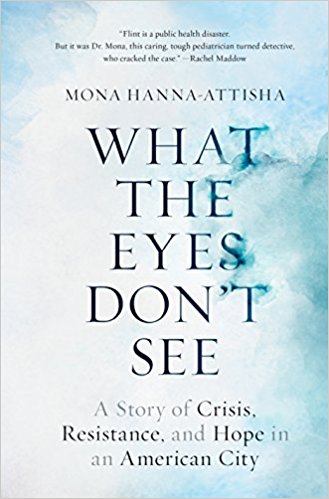By Jan Worth-Nelson
The story of Flint is a story of many deep crises the country is facing, Dr. Mona Hanna-Attisha asserted to a crowd of about 400 national reporters at the Riverfront Banquet Center in downtown Flint Wednesday night.
 She said the Flint story “is the most emblematic, environmental and public health disaster of the young century–a story of people who were charged with keeping us safe who failed and who cared more about power and money than us, or our children.”
She said the Flint story “is the most emblematic, environmental and public health disaster of the young century–a story of people who were charged with keeping us safe who failed and who cared more about power and money than us, or our children.”
It was the opening session of the national conference of the Society of Environmental Journalists, a group whose leaders said they came to Flint partly out of a sense of responsibility to the story and to let Flint know it would not be forgotten.
“A lot of badness happened here–you know that,” Hanna-Attisha said, acknowledging many of the journalists in the room had been covering or at least following the water crisis from almost the beginning. “It never should have started and it never should have gone on as long as it did.”
Hanna-Attisha is a pediatrician at Hurley Medical Center whose data on the blood lead levels of Flint children played a dramatic role in opening up the water crisis to the world.

Hanna-Attisha (Photo by Jan Worth-Nelson)
Citing the work in particular of The Flint Journal‘s Ron Fonger, ACLU advocacy journalist Curt Guyette and Michigan Radio’s Lindsey Smith, she said, “they dug and dug and dug and were persistent and annoying and never gave up seeking the answers.”
“Flint is a democracy story,” she said, repeating the history of Flint’s emergency managers history going back to 2011, an action by the state that she argued was a triggering factor of the water crisis. “This is a crisis of the breakdown of democracy–we have lost democracy, and we see that every day with gerrymandering, voter suppression, the electoral college, mass incarceration.”
The Flint story also “is a story of a deeper crisis of the disintegration of our critical infrastructure, due to austerity and inequality. It is a story of environmental injustice; it was not the first time, where predominantly poor people and people of color are disproportionately burdened by environmental contaminations.
“And Flint is a story of disrespect for science and of scientific truths,” she said, “And I don’t need to tell you that this is a story of today.that goes far beyond Flint.”
 Hanna-Attisha, author of the acclaimed water-crisis memoir What the Eyes Don’t See, continued, “Flint is also a story of our abandonment of our civic responsibility, and our deep obligation as human beings to care and provide for each other, especially our children.
Hanna-Attisha, author of the acclaimed water-crisis memoir What the Eyes Don’t See, continued, “Flint is also a story of our abandonment of our civic responsibility, and our deep obligation as human beings to care and provide for each other, especially our children.
“If we stop believing that government can keep us safe, all of us, not just the privileged ones, what do we have left? What we have is corrosion of democracy driven by austerity.” She described the effects of the crisis as “a trauma of betrayal and fear and anger.”
But, she concluded, “Flint is also a story of how we came together and how we fought back — the moms, the pastors, the journalists who woke up and said, ‘We’ve had enough.'”
The SEJ conference continues through Sunday. One of the conference coordinators, Jay Letto, said close to 700 journalists were expected to have registered by today. More information is available at sej.org.
EVM Editor Jan Worth-Nelson can be reached at janworth1118@gmail.com.


You must be logged in to post a comment.